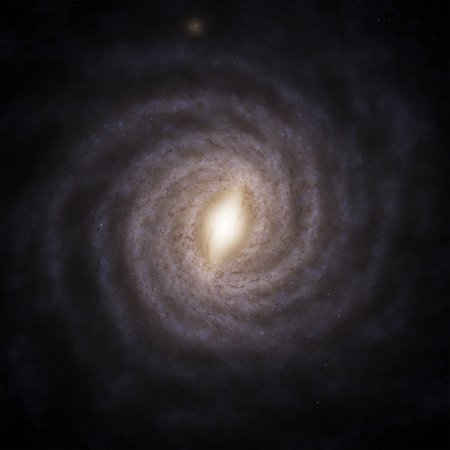Publication prize of the Leibniz-Kolleg 2024 for Dr. Ekaterina Ilin
As a part of the Leibniz Kolleg event on Thursday, May 16, the prestigious Publication Prize 2024 will be awarded to Dr. Ekaterina Ilin from the Leibniz Institute for Astrophysics Potsdam (AIP) for her doctoral thesis in the Audimax of the University of Potsdam.
Dr. Ekaterina Ilin receives the Leibniz Kolleg Publication Prize for her groundbreaking research on the habitability of exoplanets and their close connection to space weather phenomena. Her work sheds light on the effects of flares - extremely strong bursts of radiation from stars - on the atmospheres of exoplanets, especially those orbiting so-called M dwarfs - stars that are smaller than the sun.
„Ekaterina Ilin is known for her outstanding engagement and talent as a young researcher. Her academic achievements are consistently outstanding. I am impressed by her motivation and her ability to achieve both short-term and long-term research goals," says Prof. Dr. Katja Poppenhäger.
Ekaterina Ilin's research shows that M dwarfs are extremely flare-active in the first 600-800 million years, but then rapidly lose flare activity. This finding sheds new light on the evolution of stellar-planetary systems and the possible habitability of exoplanets. She also found that rapidly rotating M dwarfs prefer to produce energetic flares near their poles, in contrast to the Sun, where flares tend to occur near the equator. The finding could have important implications for the search for life-friendly exoplanets.
Ekaterina Ilin also investigated whether exoplanets influence the flare behavior of their M-dwarf hosts, which in turn could lead to changes in space weather phenomena. Her research not only contributes to the understanding of these phenomena, but also provides important new tools for future studies in exoplanet research. Her work opens up new perspectives for the understanding of star-planet systems and their dynamics.
Over the past six years, Ekaterina Ilin has produced and published significant research results at the Leibniz Institute for Astrophysics (AIP), first as part of her Master's thesis, then in her doctoral thesis, and in a subsequent year as a postdoctoral researcher. The Physikalische Gesellschaft zu Berlin also awarded Ekaterina Ilin the 2019 Physics Student Prize. She completed her doctorate in fall 2022 with the highest distinction of "summa cum laude" in the field of astrophysics. Currently, she works at the Institute for Radio Astronomy ASTRON in the Netherlands.
The publication prize of the Leibniz-Kolleg at the University of Potsdam is awarded each year to outstanding researchers who have made a significant contribution to science through their groundbreaking work. The prize is endowed with 2500 euros. The initiative of the Leibniz-Kolleg, which has existed since 1997, serves to promote young scientists in mathematics and the natural sciences.
As a part of the Leibniz Kolleg event on Thursday, May 16, the prestigious Publication Prize 2024 will be awarded to Dr. Ekaterina Ilin from the Leibniz Institute for Astrophysics Potsdam (AIP) for her doctoral thesis in the Audimax of the University of Potsdam.
Dr. Ekaterina Ilin receives the Leibniz Kolleg Publication Prize for her groundbreaking research on the habitability of exoplanets and their close connection to space weather phenomena. Her work sheds light on the effects of flares - extremely strong bursts of radiation from stars - on the atmospheres of exoplanets, especially those orbiting so-called M dwarfs - stars that are smaller than the sun.
„Ekaterina Ilin is known for her outstanding engagement and talent as a young researcher. Her academic achievements are consistently outstanding. I am impressed by her motivation and her ability to achieve both short-term and long-term research goals," says Prof. Dr. Katja Poppenhäger.
Ekaterina Ilin's research shows that M dwarfs are extremely flare-active in the first 600-800 million years, but then rapidly lose flare activity. This finding sheds new light on the evolution of stellar-planetary systems and the possible habitability of exoplanets. She also found that rapidly rotating M dwarfs prefer to produce energetic flares near their poles, in contrast to the Sun, where flares tend to occur near the equator. The finding could have important implications for the search for life-friendly exoplanets.
Ekaterina Ilin also investigated whether exoplanets influence the flare behavior of their M-dwarf hosts, which in turn could lead to changes in space weather phenomena. Her research not only contributes to the understanding of these phenomena, but also provides important new tools for future studies in exoplanet research. Her work opens up new perspectives for the understanding of star-planet systems and their dynamics.
Over the past six years, Ekaterina Ilin has produced and published significant research results at the Leibniz Institute for Astrophysics (AIP), first as part of her Master's thesis, then in her doctoral thesis, and in a subsequent year as a postdoctoral researcher. The Physikalische Gesellschaft zu Berlin also awarded Ekaterina Ilin the 2019 Physics Student Prize. She completed her doctorate in fall 2022 with the highest distinction of "summa cum laude" in the field of astrophysics. Currently, she works at the Institute for Radio Astronomy ASTRON in the Netherlands.
The publication prize of the Leibniz-Kolleg at the University of Potsdam is awarded each year to outstanding researchers who have made a significant contribution to science through their groundbreaking work. The prize is endowed with 2500 euros. The initiative of the Leibniz-Kolleg, which has existed since 1997, serves to promote young scientists in mathematics and the natural sciences.
Images
Big screen size [1000 x 666, 50 KB]
Original size [1501 x 1000, 100 KB]





